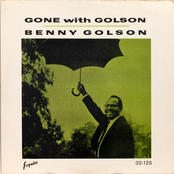Gone With Golson

Biography
Benny Golson (born January 25, 1929) is an American bebop/hard bop jazz tenor saxophonist, composer, and arranger. While in high school in Philadelphia, Pennsylvania Golson played with several other promising young musicians, including John Coltrane, Red Garland, Jimmy Heath, Percy Heath, Philly Joe Jones, and Red Rodney. After graduating from Howard University Golson joined Bull Moose Jackson's rhythm and blues band; Tadd Dameron, whom Golson came to consider the most important influence on h...
Benny Golson (born January 25, 1929) is an American bebop/hard bop jazz tenor saxophonist, composer, and arranger.
While in high school in Philadelphia, Pennsylvania Golson played with several other promising young musicians, including John Coltrane, Red Garland, Jimmy Heath, Percy Heath, Philly Joe Jones, and Red Rodney. After graduating from Howard University Golson joined Bull Moose Jackson's rhythm and blues band; Tadd Dameron, whom Golson came to consider the most important influence on his writing, was Jackson's pianist at the time.
From 1953 to 1959 Golson played with Dameron's band and then with the bands of Lionel Hampton, Johnny Hodges, Earl Bostic, Dizzy Gillespie, and Art Blakey and the Jazz Messengers with whom he recorded the classic Moanin' in 1958.
Golson was working with the Lionel Hampton band at the Apollo Theater in Harlem in 1956 when he learned that Clifford Brown, a noted and well-liked jazz trumpeter who had done a stint with him in Hampton's band, had died in a car accident. Golson was so moved by the event that he composed the threnody "I Remember Clifford", as a tribute to a fellow musician and friend.
Golson has composed several other jazz standards, such as "Stablemates", "Killer Joe", "Whisper Not", "Along Came Betty" and "Are You Real?", that have gone on to be performed and recorded by many musicians.
From 1959 to 1962 Golson co-led the Jazztet with Art Farmer. Golson then left jazz to concentrate on studio and orchestral work for 12 years. During this time he composed music for such television shows as Ironside, Room 222, M*A*S*H, and Mission: Impossible. During the mid-1970s Golson returned to jazz playing and recording. In 1982 he re-organized the Jazztet.
In 1995 Golson received the NEA Jazz Masters Award of the National Endowment for the Arts.
Golson made a cameo appearance in the 2004 movie The Terminal, related to his appearance in the A Great Day in Harlem photo. As of 2007, he tours regularly.
In October 2007 Golson received the Mellon Living Legend Legacy Award presented by the Mid Atlantic Arts Foundation at a ceremony at the Kennedy Center. Additionally, during the same month, he won the University of Pittsburgh International Academy of Jazz Outstanding Lifetime Achievement Award at the university's 37th Annual Jazz Concert in the Carnegie Music Hall.
In November 2009, Benny was inducted into the International Academy of Jazz Hall of Fame during a performance at the University of Pittsburgh's annual jazz seminar and concert.
The Howard University Jazz Studies program created a prestigious award in his honor called the "Benny Golson Jazz Master Award" in 1996. Several distinguished jazz artists have received this award.
Read more on Last.fm. User-contributed text is available under the Creative Commons By-SA License; additional terms may apply.
